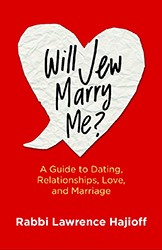Rabbi Lawrence Hajioff’s new book, Will Jew Marry Me? is a great selection with the Jewish celebration of Tu B’Av on the horizon. Rabbi Hajioff is guest blogging for Jewish Book Council asa part as the Visiting Scribe series here on The ProsenPeople.
Dating has become a real challenge for many young Jewish men and women. Most people have taken to online dating in order to find their soul mate. Websites like JDate and Saw You at Sinai as well as apps like JSwipe have become most people’s first choice in finding their other half. For some, these avenues have proven successful, but for many others online dating hasn’t delivered in its promise of finding, as JDate puts it, “People who share your love of bagels and lox.”
Some are calling the surplus of young and eligible Jewish men and women a “singles crisis”. Maybe it is, or maybe it isn’t, but either way, this isn’t the first time in Jewish history we’ve seen a large group of Jewish men and women trying to find love relationships.
In Taanit 30b, the Talmud speaks about one of the happiest days in the Jewish calendar, the Fifteenth of Av, or Tu B’Av, as the date spells out in Hebrew. A number of events are attributed to this festive day in Jewish history. One of them involved a certain custom of pairing up young single men and women for marriage. The women of Jerusalem would dress up in white borrowed garments and go dance in the vineyards. The young single men would go and watch them, and the women would say, “Young men, raise up your eyes and see what you choose for yourself, do not pay attention to beauty, pay attention to family.” This was the successful method they used in stemming the tide of singles in the Jewish community. And, according to the Talmud, it worked.
Is there a secret here which may help us match up Jewish singles today?
Well the first thing that struck me about this Tu B’Av ritual was how our ancestors considered the matching up of young men and women for potential marriage as the happiest day of the year! It wasn’t seen as an inconvenience, or a pitiful event to offload the remaining singles; on the contrary, matching singles was seen as a very spiritual and holy duty, that the Talmud even compared to the spiritual effort that was put into Yom Kippur.
Another aspect to this ancient version of JDate I find interesting is how young men and women were not left to their own devices in finding a marriage partner. It wasn’t a case of go to college, get a job, and go find a spouse: instead the entire community took responsibility for all the singles, helping them find their potential soul mates. In my new book, Will Jew Marry Me? A Guide to Dating, Relationships, Love, and Marriage, I write that of all the mitzvot in the Torah, getting married is considered a Jew’s first priority. As a community we do a number of actions to take care of others. We assist others in finding work, we give charity to the needy, we build hospitals and libraries and perform many other wonderful charitable acts. I believe just like our ancestors, matching singles should be a communal project we all join in to perform.
What was the purpose of the women borrowing white garments — why didn’t they just wear their own? The reason is so that no woman would be embarrassed by those who had more. The king’s daughter, who was presumably very rich, wore the same attire as the daughter of the daughter of the High Priest, who may not have been so well off. This extended to all of society, in which rich and poor, irrespective of what they possessed, would look the same on Tu B’Av, to be valued for who they were, not what they had.
I’m not sure making women wear one another’s clothing would work today, but the message is a good one. Giving advice to single men and women in their dating efforts and assisting them with sound and honest council, so they don’t make the mistake of judging potential mates purely by what they have, but rather by who they truly are, could do much in helping them find their way under the chuppah.
Finally, and I realize that this is a stretch in dating today, the amount of time young men and women date for, needs to be curtailed somewhat. I’m not suggesting one night dating like the original Tu B’Av is at all practical today, however the young men and women I meet who date for three, four and sometimes many more years before they become engaged (or in many cases break up) can be reduced in order not to waste each other’s time.
So maybe dancing in vineyards like our ancestors isn’t really viable in today’s day and age, however creating communal events, having married couples take responsibility for setting up their single friends, and structuring our communities as a source of advice and support for dating couples certainly is.
Rabbi Lawrence Hajioff is the author of Jews Got Questions? and Will Jew Marry Me?: A Guide to Dating, Relationships, Love, and Marriage.
Related Content:
Originally from London, England, Rabbi Lawrence Hajioff graduated with honors in political science from Manchester University. After working for MTV in news production, and winning the national competition ‘Jewish Stand-Up Comedian’ of the Year, Rabbi Hajioff traveled to study in Israel and then Monsey to receive his rabbinical ordination. Rabbi Hajioff is the educational director of Birthright Israel Alumni in Manhattan, New York.
Would Tu B’Av Dating Work Today?
The Chuppah: What’s Happening Underneath?
2015
Five Reasons You Should Crowdfund Your Next Book
A New Take on Old Classics: How a Rabbi Approaches Challenging Questions




